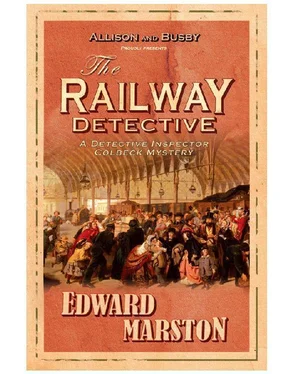Edward Marston - The Railway Detective
Здесь есть возможность читать онлайн «Edward Marston - The Railway Detective» весь текст электронной книги совершенно бесплатно (целиком полную версию без сокращений). В некоторых случаях можно слушать аудио, скачать через торрент в формате fb2 и присутствует краткое содержание. Жанр: Классический детектив, Исторический детектив, на английском языке. Описание произведения, (предисловие) а так же отзывы посетителей доступны на портале библиотеки ЛибКат.
- Название:The Railway Detective
- Автор:
- Жанр:
- Год:неизвестен
- ISBN:нет данных
- Рейтинг книги:4 / 5. Голосов: 1
-
Избранное:Добавить в избранное
- Отзывы:
-
Ваша оценка:
- 80
- 1
- 2
- 3
- 4
- 5
The Railway Detective: краткое содержание, описание и аннотация
Предлагаем к чтению аннотацию, описание, краткое содержание или предисловие (зависит от того, что написал сам автор книги «The Railway Detective»). Если вы не нашли необходимую информацию о книге — напишите в комментариях, мы постараемся отыскать её.
The Railway Detective — читать онлайн бесплатно полную книгу (весь текст) целиком
Ниже представлен текст книги, разбитый по страницам. Система сохранения места последней прочитанной страницы, позволяет с удобством читать онлайн бесплатно книгу «The Railway Detective», без необходимости каждый раз заново искать на чём Вы остановились. Поставьте закладку, и сможете в любой момент перейти на страницу, на которой закончили чтение.
Интервал:
Закладка:
‘That will not be necessary,’ decided Colbeck, impressed by his manner and bearing. ‘I simply need to examine the key in question.’
‘It is locked in the safe, Inspector.’
‘Before you take it out, perhaps you could explain to me why the mail train was carrying such a large amount of money in gold coin.’
‘Of course,’ replied Kitson. ‘We abide by the spirit of the Bank Charter Act of 1844. Does that mean anything to you, Inspector?’
‘No, Mr Kitson.’
‘Then let me enlighten you. Currency crises are the bane of banking and we have suffered them on a recurring basis. When he was Prime Minister, the late Mr Peel sought to end the cycle by imposing certain restrictions. Strict limits were placed on the issue of notes by individual banks and the fiduciary note issue of the Bank of England was set at £14,000,000. Any notes issued above this sum were to be covered by coin or gold bullion.’
‘That sounds like a sensible precaution.’
‘It is one that Spurling’s Bank took to heart,’ explained Kitson. ‘We stick to that same principle and ensure that notes in all our banks are balanced by a supply of gold coin or bullion. A bank note, after all, is only a piece of paper that bears promise of payment. In the event of a sudden demand for real money, we are in a position to cope. Other banks have collapsed in such situations because they over-extended themselves with loans and had inadequate reserves.’
‘How much of the money stolen was destined for this branch?’
‘Over a half of it. The rest was to be shared between some of our smaller branches. None of us,’ he emphasized, ‘can afford to lose that money.’ Taking a key from his waistcoat pocket, he crossed to the safe in the corner. ‘Let me show you what you came to see.’
‘What about the combination number of the safe on the train?’
‘That, too, is kept in here.’
‘Have you not memorised it, Mr Kitson?’
‘I’m a banker, Inspector,’ he said. ‘I keep a record of everything.’
He opened the safe and took out a metal box that had a separate lock on it. After using a second key to open it, he handed the box to Colbeck. Inside was a slip of paper and a large key on a ring. Colbeck took them out and studied them carefully. Kitson watched in surprise when the detective produced a magnifying glass from his inside pocket to scrutinise the key more carefully. He even held it to his nose and sniffed it.
‘May I ask what you are doing?’ said Kitson, intrigued.
‘Looking for traces of wax, sir. That’s the way that duplicates are made. A mould is taken so that it can be used to produce an identical key. Not all locksmiths are as law-abiding as they should be, alas.’
‘And this key?’
‘It has not been tampered with,’ said Colbeck.
‘That is what I told you.’
‘I needed to check for myself.’
‘The only other set of keys is at the Royal Mint.’
‘My colleague, Sergeant Leeming, will be visiting the Mint this very day, but I doubt if he will find a lapse in security there. Their procedures are usually faultless. That leaves only a third option.’
‘And what is that, Inspector?’
‘A visit to the factory where the safe was made,’ said Colbeck, handing the key back to him. ‘Please excuse me, Mr Kitson. I have to catch a train to Wolverhampton.’
Victor Leeming’s day had had an abrasive start to it. When he reported to Tallis, he had found the Superintendent at his most irascible as he read the accounts of the train robbery in the morning newspapers. Seeing himself mocked, and misquoted, Tallis had taken out his anger on the Sergeant and left him feeling as if he had just been mauled by a Bengal tiger. Leeming was glad to escape to the Royal Mint where he could lick his wounds. His guide was a far less truculent companion.
‘As you see, Sergeant Leeming,’ he said, ‘security has absolute priority here. Nobody has sole access to the keys to that safe. There are always two of us present, so it would be impossible for anybody to take a wax impression of the key.’
‘I accept that, Mr Omber.’
‘There has been a mint here on Tower Hill since Roman times. Methods of guarding the supply of coin thus have a long and honourable history. Having learnt from our predecessors, we feel that we have turned the Royal Mint into an impregnable stronghold.’
‘There is no question of that,’ conceded Leeming.
He was fascinated by all he had seen, particularly by the thick steel doors that seemed to be fitted everywhere. Once locked, they were almost airtight, and would not buckle before a barrel of gunpowder. Charles Omber took a justifiable pride in their security arrangements. He was a short, stout, middle-aged man whose paunch erupted out of his body and tested the buttons on his trousers to their limit. Having been subjected to Tallis’s bellow, Leeming was grateful for Omber’s quiet, friendly, helpful voice.
‘What else can I show you, Sergeant?’ he asked.
‘While I’m here, I’d be interested to see the whole process.’
‘It will be a pleasure to show you.’
‘Thank you.’
Omber waddled off and Leeming fell in beside him. After passing the weighing room, where the amounts of bullion were carefully recorded, they went through some steel doors into the hot metallic atmosphere of the refining shop. Leeming brought up a hand to shield his eyes from the startling brilliance of the furnaces where molten gold was simmering in crucibles like over-heated soup. With long-handled dipping cups, refiners stood in their shirtsleeves before the furnaces to scoop out the liquid gold and pour it into zinc vats of water. Even those who were used to the heat and the noise had to use their bare forearms to wipe the sweat from their faces. Leeming was loosening his collar with a finger within seconds.
Charles Omber took him on to the corroding shop, where they were met with billowing steam from the porcelain vats in which the golden granules sizzled in hot nitric acid. It was like walking into a golden fog. When his eyes grew accustomed to the haze, Leeming watched the muscular men in their leather aprons and noticed that they all wore hats to protect them from the fumes. Interested to see every stage of the process, he was nevertheless relieved when they moved out of the room, enabling him to breathe more easily.
In the casting shop, with its arched furnace bricked into a wall, he saw the gold being melted again before being poured with utmost care into the moulds of the ingots. Standing at his shoulder, Omber explained what was happening then took his visitor on into the rolling room, the largest and most deafening part of the establishment. The massive steam-driven mill, powered by iron wheels on each side, thundered ceaselessly on, enabling the brick-like ingots to be pressed into long strips from which coins could be punched.
It was when they moved into the coining shop that Leeming suddenly realised something. He had to shout above the metallic chatter of the machines.
‘I think I know why the robbers stole coin from that train,’ he yelled. ‘What is the melting point of gold?’
‘That depends on its source and composition,’ replied Omber, ‘but it is usually between 1,200 and 1,420 degrees centigrade. Why do you ask, Sergeant Leeming?’
‘They would need a furnace to handle gold bullion so the robbers let the Royal Mint do their work for them and waited until a shipment of coin was being made. They chose carefully,’ he said, watching the blank discs being cut out of the metal. ‘Had the train been carrying an issue of notes from the Bank of England, they would have ignored them because they might be traced by their serial numbers. Gold sovereigns are more easily disposed of, Mr Omber.’
Читать дальшеИнтервал:
Закладка:
Похожие книги на «The Railway Detective»
Представляем Вашему вниманию похожие книги на «The Railway Detective» списком для выбора. Мы отобрали схожую по названию и смыслу литературу в надежде предоставить читателям больше вариантов отыскать новые, интересные, ещё непрочитанные произведения.
Обсуждение, отзывы о книге «The Railway Detective» и просто собственные мнения читателей. Оставьте ваши комментарии, напишите, что Вы думаете о произведении, его смысле или главных героях. Укажите что конкретно понравилось, а что нет, и почему Вы так считаете.












